MGT502 - Business Sustainability and Global Organizations Bibliography
VerifiedAdded on 2023/02/01
|9
|2243
|33
Homework Assignment
AI Summary
This assignment is an annotated bibliography focusing on contemporary issues in business sustainability. It explores key aspects such as corporate social responsibility, business ethics, and sustainable business models. The bibliography includes analyses of ten academic sources, including journal articles and a book, examining topics like the meaning of sustainable business, intertemporal tensions, corporate citizenship in a globalized world, business sustainability performance, stakeholder frameworks in supply chains, and business models for sustainability. The papers delve into how businesses can achieve sustainability by incorporating the interests of all stakeholders, managing corporate citizenship duties, and implementing sustainable business models. The assignment highlights the importance of integrating economic, social, and environmental efforts to ensure long-term business viability and growth. The conclusion emphasizes the need for managers to address multiple facets to ensure future sustainability.
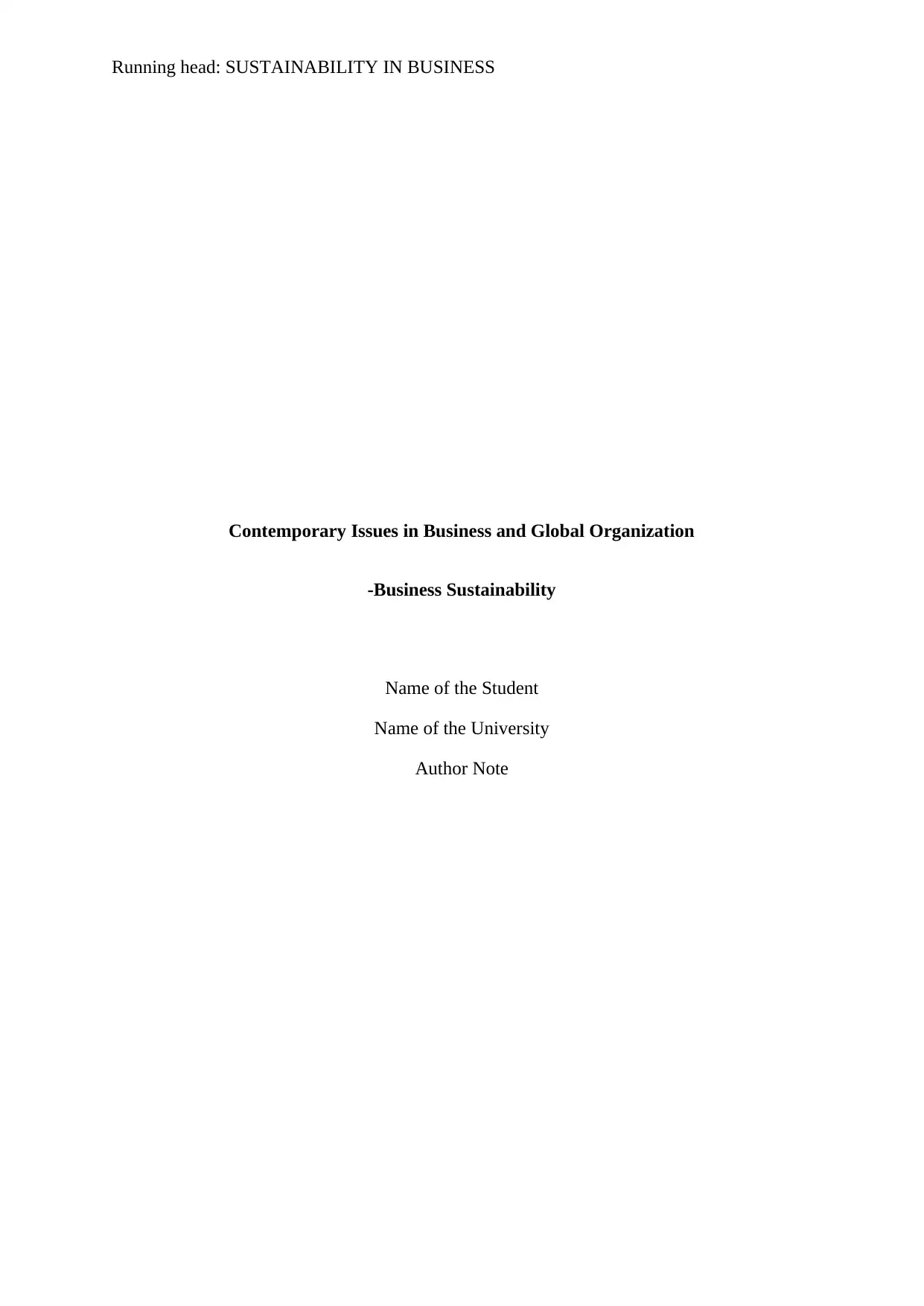
Running head: SUSTAINABILITY IN BUSINESS
Contemporary Issues in Business and Global Organization
-Business Sustainability
Name of the Student
Name of the University
Author Note
Contemporary Issues in Business and Global Organization
-Business Sustainability
Name of the Student
Name of the University
Author Note
Paraphrase This Document
Need a fresh take? Get an instant paraphrase of this document with our AI Paraphraser
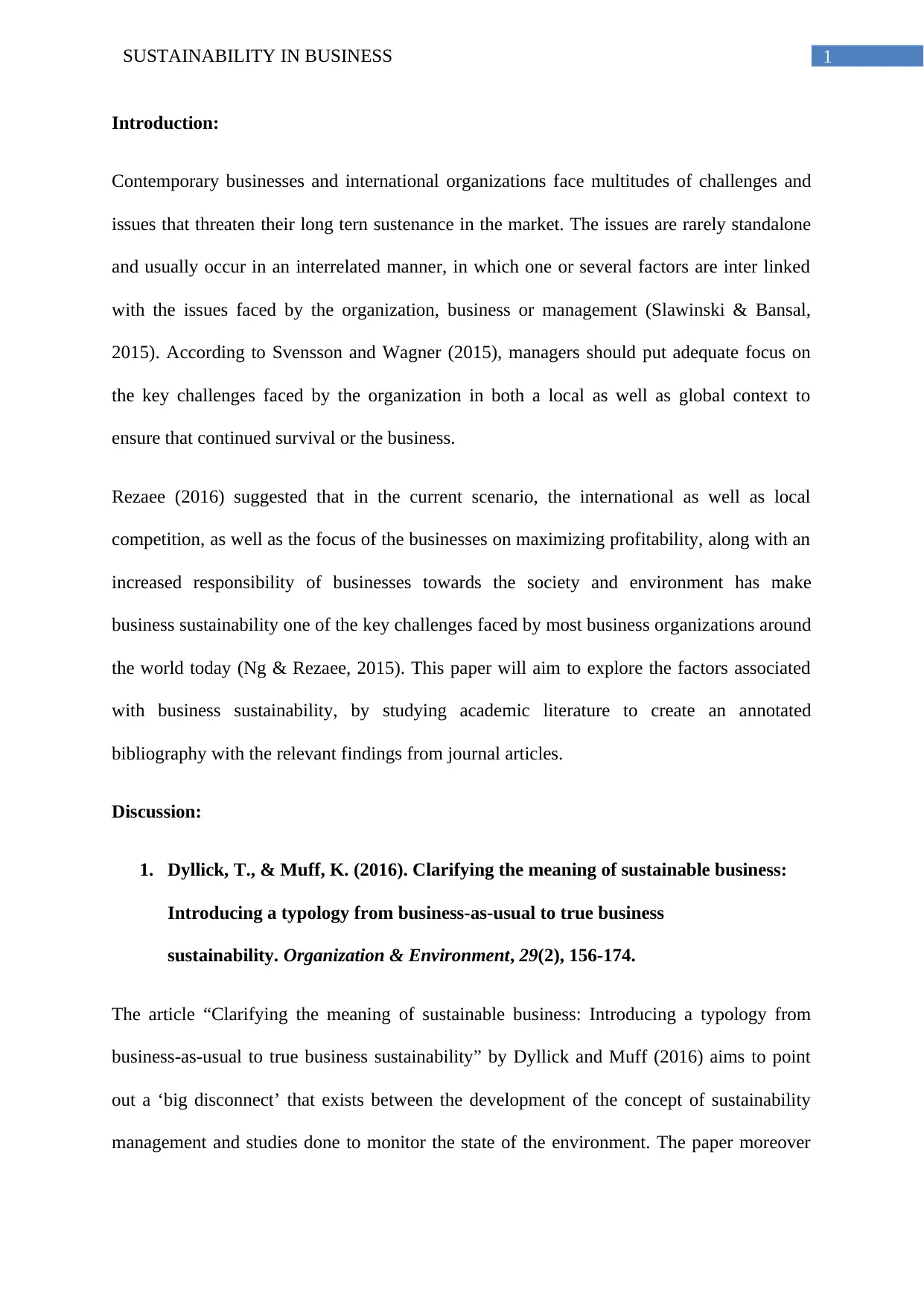
1SUSTAINABILITY IN BUSINESS
Introduction:
Contemporary businesses and international organizations face multitudes of challenges and
issues that threaten their long tern sustenance in the market. The issues are rarely standalone
and usually occur in an interrelated manner, in which one or several factors are inter linked
with the issues faced by the organization, business or management (Slawinski & Bansal,
2015). According to Svensson and Wagner (2015), managers should put adequate focus on
the key challenges faced by the organization in both a local as well as global context to
ensure that continued survival or the business.
Rezaee (2016) suggested that in the current scenario, the international as well as local
competition, as well as the focus of the businesses on maximizing profitability, along with an
increased responsibility of businesses towards the society and environment has make
business sustainability one of the key challenges faced by most business organizations around
the world today (Ng & Rezaee, 2015). This paper will aim to explore the factors associated
with business sustainability, by studying academic literature to create an annotated
bibliography with the relevant findings from journal articles.
Discussion:
1. Dyllick, T., & Muff, K. (2016). Clarifying the meaning of sustainable business:
Introducing a typology from business-as-usual to true business
sustainability. Organization & Environment, 29(2), 156-174.
The article “Clarifying the meaning of sustainable business: Introducing a typology from
business-as-usual to true business sustainability” by Dyllick and Muff (2016) aims to point
out a ‘big disconnect’ that exists between the development of the concept of sustainability
management and studies done to monitor the state of the environment. The paper moreover
Introduction:
Contemporary businesses and international organizations face multitudes of challenges and
issues that threaten their long tern sustenance in the market. The issues are rarely standalone
and usually occur in an interrelated manner, in which one or several factors are inter linked
with the issues faced by the organization, business or management (Slawinski & Bansal,
2015). According to Svensson and Wagner (2015), managers should put adequate focus on
the key challenges faced by the organization in both a local as well as global context to
ensure that continued survival or the business.
Rezaee (2016) suggested that in the current scenario, the international as well as local
competition, as well as the focus of the businesses on maximizing profitability, along with an
increased responsibility of businesses towards the society and environment has make
business sustainability one of the key challenges faced by most business organizations around
the world today (Ng & Rezaee, 2015). This paper will aim to explore the factors associated
with business sustainability, by studying academic literature to create an annotated
bibliography with the relevant findings from journal articles.
Discussion:
1. Dyllick, T., & Muff, K. (2016). Clarifying the meaning of sustainable business:
Introducing a typology from business-as-usual to true business
sustainability. Organization & Environment, 29(2), 156-174.
The article “Clarifying the meaning of sustainable business: Introducing a typology from
business-as-usual to true business sustainability” by Dyllick and Muff (2016) aims to point
out a ‘big disconnect’ that exists between the development of the concept of sustainability
management and studies done to monitor the state of the environment. The paper moreover
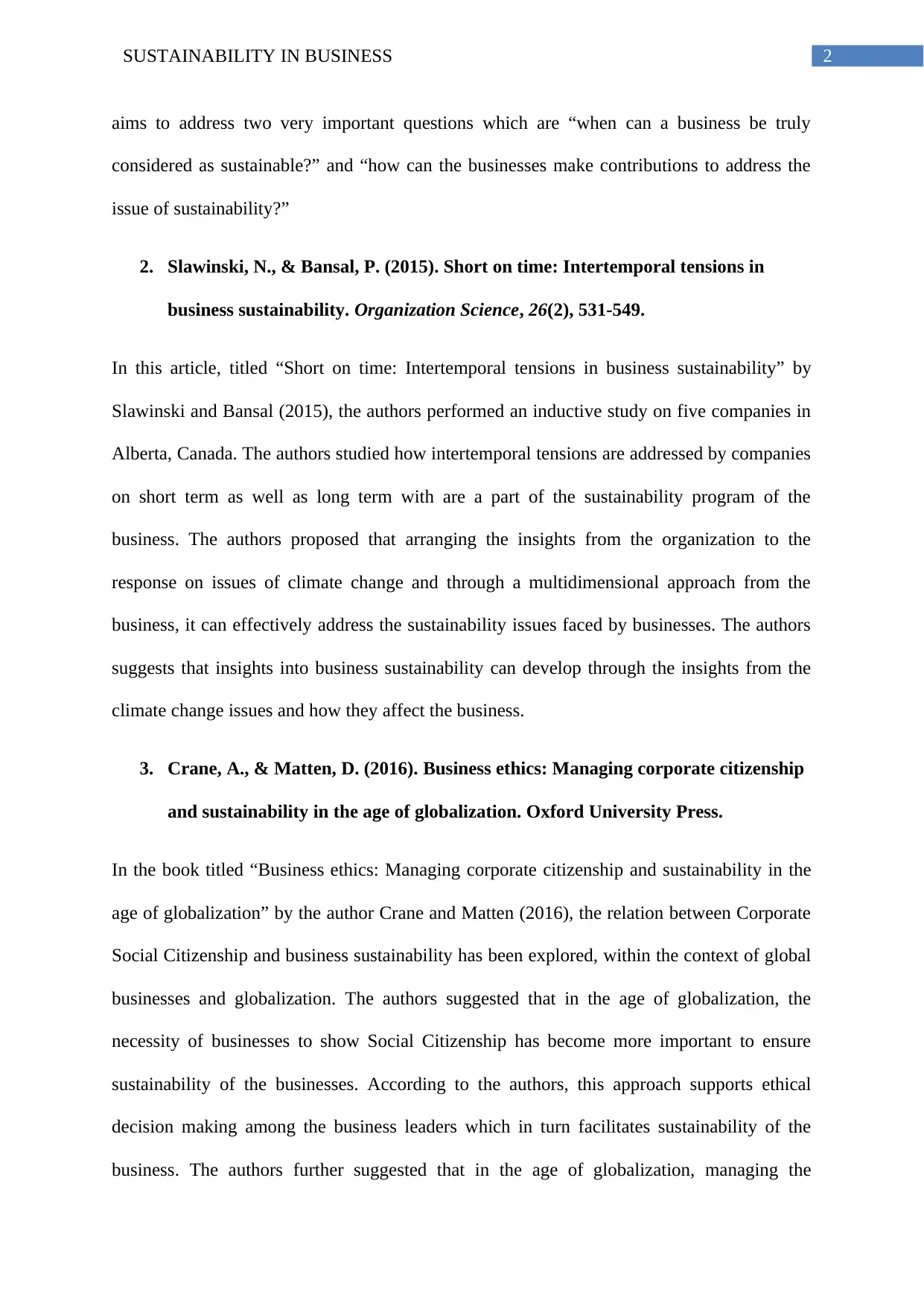
2SUSTAINABILITY IN BUSINESS
aims to address two very important questions which are “when can a business be truly
considered as sustainable?” and “how can the businesses make contributions to address the
issue of sustainability?”
2. Slawinski, N., & Bansal, P. (2015). Short on time: Intertemporal tensions in
business sustainability. Organization Science, 26(2), 531-549.
In this article, titled “Short on time: Intertemporal tensions in business sustainability” by
Slawinski and Bansal (2015), the authors performed an inductive study on five companies in
Alberta, Canada. The authors studied how intertemporal tensions are addressed by companies
on short term as well as long term with are a part of the sustainability program of the
business. The authors proposed that arranging the insights from the organization to the
response on issues of climate change and through a multidimensional approach from the
business, it can effectively address the sustainability issues faced by businesses. The authors
suggests that insights into business sustainability can develop through the insights from the
climate change issues and how they affect the business.
3. Crane, A., & Matten, D. (2016). Business ethics: Managing corporate citizenship
and sustainability in the age of globalization. Oxford University Press.
In the book titled “Business ethics: Managing corporate citizenship and sustainability in the
age of globalization” by the author Crane and Matten (2016), the relation between Corporate
Social Citizenship and business sustainability has been explored, within the context of global
businesses and globalization. The authors suggested that in the age of globalization, the
necessity of businesses to show Social Citizenship has become more important to ensure
sustainability of the businesses. According to the authors, this approach supports ethical
decision making among the business leaders which in turn facilitates sustainability of the
business. The authors further suggested that in the age of globalization, managing the
aims to address two very important questions which are “when can a business be truly
considered as sustainable?” and “how can the businesses make contributions to address the
issue of sustainability?”
2. Slawinski, N., & Bansal, P. (2015). Short on time: Intertemporal tensions in
business sustainability. Organization Science, 26(2), 531-549.
In this article, titled “Short on time: Intertemporal tensions in business sustainability” by
Slawinski and Bansal (2015), the authors performed an inductive study on five companies in
Alberta, Canada. The authors studied how intertemporal tensions are addressed by companies
on short term as well as long term with are a part of the sustainability program of the
business. The authors proposed that arranging the insights from the organization to the
response on issues of climate change and through a multidimensional approach from the
business, it can effectively address the sustainability issues faced by businesses. The authors
suggests that insights into business sustainability can develop through the insights from the
climate change issues and how they affect the business.
3. Crane, A., & Matten, D. (2016). Business ethics: Managing corporate citizenship
and sustainability in the age of globalization. Oxford University Press.
In the book titled “Business ethics: Managing corporate citizenship and sustainability in the
age of globalization” by the author Crane and Matten (2016), the relation between Corporate
Social Citizenship and business sustainability has been explored, within the context of global
businesses and globalization. The authors suggested that in the age of globalization, the
necessity of businesses to show Social Citizenship has become more important to ensure
sustainability of the businesses. According to the authors, this approach supports ethical
decision making among the business leaders which in turn facilitates sustainability of the
business. The authors further suggested that in the age of globalization, managing the
⊘ This is a preview!⊘
Do you want full access?
Subscribe today to unlock all pages.

Trusted by 1+ million students worldwide
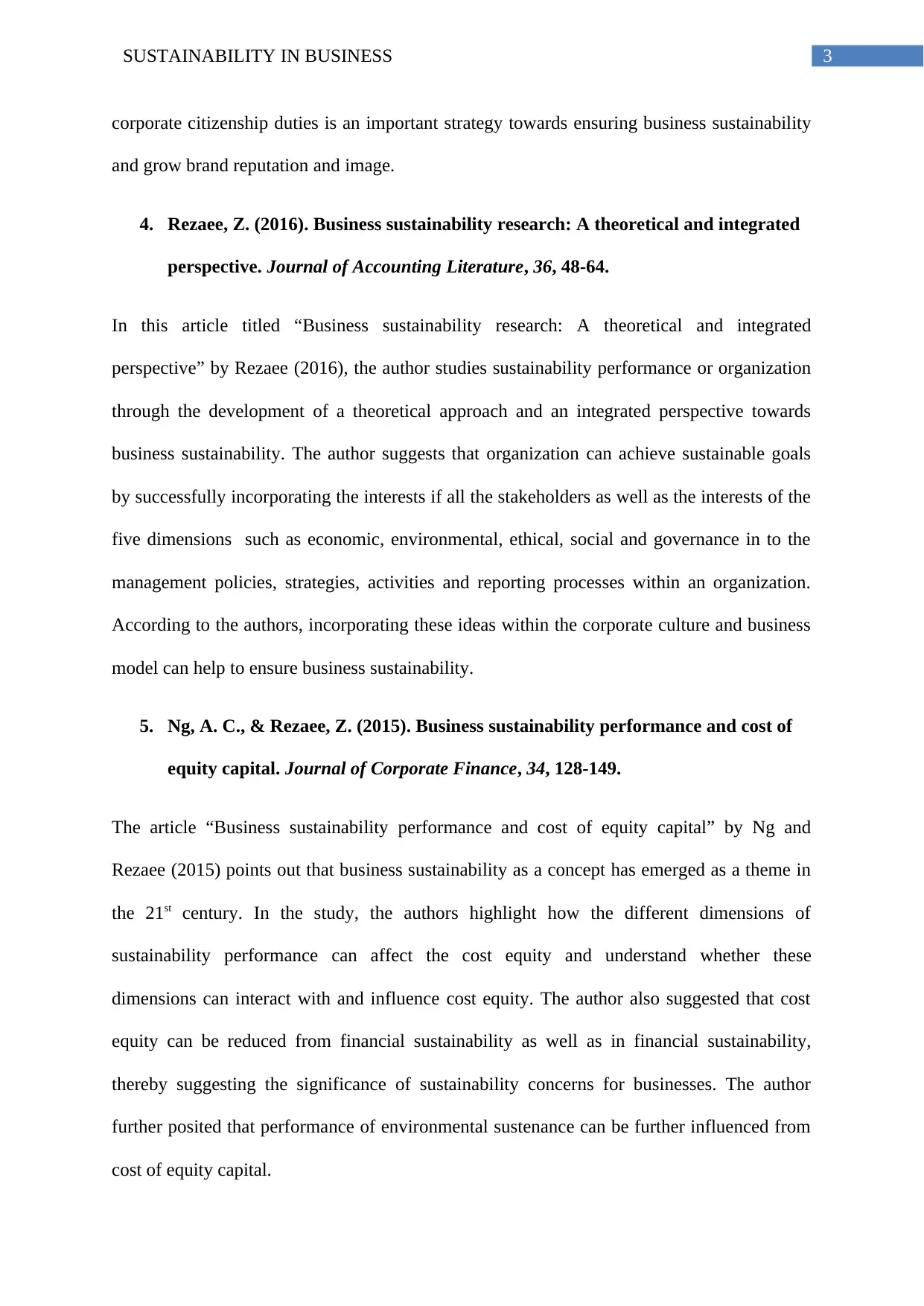
3SUSTAINABILITY IN BUSINESS
corporate citizenship duties is an important strategy towards ensuring business sustainability
and grow brand reputation and image.
4. Rezaee, Z. (2016). Business sustainability research: A theoretical and integrated
perspective. Journal of Accounting Literature, 36, 48-64.
In this article titled “Business sustainability research: A theoretical and integrated
perspective” by Rezaee (2016), the author studies sustainability performance or organization
through the development of a theoretical approach and an integrated perspective towards
business sustainability. The author suggests that organization can achieve sustainable goals
by successfully incorporating the interests if all the stakeholders as well as the interests of the
five dimensions such as economic, environmental, ethical, social and governance in to the
management policies, strategies, activities and reporting processes within an organization.
According to the authors, incorporating these ideas within the corporate culture and business
model can help to ensure business sustainability.
5. Ng, A. C., & Rezaee, Z. (2015). Business sustainability performance and cost of
equity capital. Journal of Corporate Finance, 34, 128-149.
The article “Business sustainability performance and cost of equity capital” by Ng and
Rezaee (2015) points out that business sustainability as a concept has emerged as a theme in
the 21st century. In the study, the authors highlight how the different dimensions of
sustainability performance can affect the cost equity and understand whether these
dimensions can interact with and influence cost equity. The author also suggested that cost
equity can be reduced from financial sustainability as well as in financial sustainability,
thereby suggesting the significance of sustainability concerns for businesses. The author
further posited that performance of environmental sustenance can be further influenced from
cost of equity capital.
corporate citizenship duties is an important strategy towards ensuring business sustainability
and grow brand reputation and image.
4. Rezaee, Z. (2016). Business sustainability research: A theoretical and integrated
perspective. Journal of Accounting Literature, 36, 48-64.
In this article titled “Business sustainability research: A theoretical and integrated
perspective” by Rezaee (2016), the author studies sustainability performance or organization
through the development of a theoretical approach and an integrated perspective towards
business sustainability. The author suggests that organization can achieve sustainable goals
by successfully incorporating the interests if all the stakeholders as well as the interests of the
five dimensions such as economic, environmental, ethical, social and governance in to the
management policies, strategies, activities and reporting processes within an organization.
According to the authors, incorporating these ideas within the corporate culture and business
model can help to ensure business sustainability.
5. Ng, A. C., & Rezaee, Z. (2015). Business sustainability performance and cost of
equity capital. Journal of Corporate Finance, 34, 128-149.
The article “Business sustainability performance and cost of equity capital” by Ng and
Rezaee (2015) points out that business sustainability as a concept has emerged as a theme in
the 21st century. In the study, the authors highlight how the different dimensions of
sustainability performance can affect the cost equity and understand whether these
dimensions can interact with and influence cost equity. The author also suggested that cost
equity can be reduced from financial sustainability as well as in financial sustainability,
thereby suggesting the significance of sustainability concerns for businesses. The author
further posited that performance of environmental sustenance can be further influenced from
cost of equity capital.
Paraphrase This Document
Need a fresh take? Get an instant paraphrase of this document with our AI Paraphraser
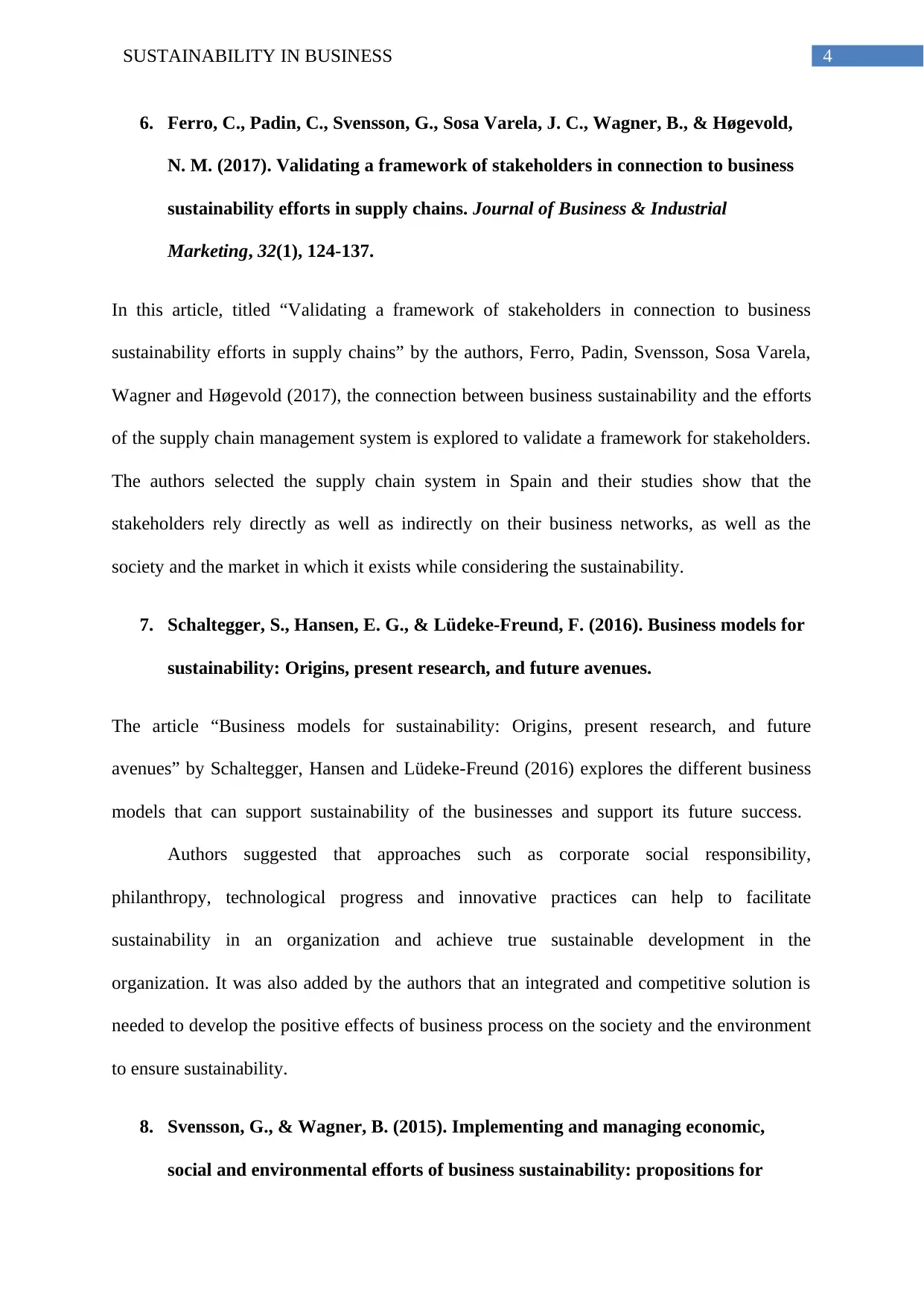
4SUSTAINABILITY IN BUSINESS
6. Ferro, C., Padin, C., Svensson, G., Sosa Varela, J. C., Wagner, B., & Høgevold,
N. M. (2017). Validating a framework of stakeholders in connection to business
sustainability efforts in supply chains. Journal of Business & Industrial
Marketing, 32(1), 124-137.
In this article, titled “Validating a framework of stakeholders in connection to business
sustainability efforts in supply chains” by the authors, Ferro, Padin, Svensson, Sosa Varela,
Wagner and Høgevold (2017), the connection between business sustainability and the efforts
of the supply chain management system is explored to validate a framework for stakeholders.
The authors selected the supply chain system in Spain and their studies show that the
stakeholders rely directly as well as indirectly on their business networks, as well as the
society and the market in which it exists while considering the sustainability.
7. Schaltegger, S., Hansen, E. G., & Lüdeke-Freund, F. (2016). Business models for
sustainability: Origins, present research, and future avenues.
The article “Business models for sustainability: Origins, present research, and future
avenues” by Schaltegger, Hansen and Lüdeke-Freund (2016) explores the different business
models that can support sustainability of the businesses and support its future success.
Authors suggested that approaches such as corporate social responsibility,
philanthropy, technological progress and innovative practices can help to facilitate
sustainability in an organization and achieve true sustainable development in the
organization. It was also added by the authors that an integrated and competitive solution is
needed to develop the positive effects of business process on the society and the environment
to ensure sustainability.
8. Svensson, G., & Wagner, B. (2015). Implementing and managing economic,
social and environmental efforts of business sustainability: propositions for
6. Ferro, C., Padin, C., Svensson, G., Sosa Varela, J. C., Wagner, B., & Høgevold,
N. M. (2017). Validating a framework of stakeholders in connection to business
sustainability efforts in supply chains. Journal of Business & Industrial
Marketing, 32(1), 124-137.
In this article, titled “Validating a framework of stakeholders in connection to business
sustainability efforts in supply chains” by the authors, Ferro, Padin, Svensson, Sosa Varela,
Wagner and Høgevold (2017), the connection between business sustainability and the efforts
of the supply chain management system is explored to validate a framework for stakeholders.
The authors selected the supply chain system in Spain and their studies show that the
stakeholders rely directly as well as indirectly on their business networks, as well as the
society and the market in which it exists while considering the sustainability.
7. Schaltegger, S., Hansen, E. G., & Lüdeke-Freund, F. (2016). Business models for
sustainability: Origins, present research, and future avenues.
The article “Business models for sustainability: Origins, present research, and future
avenues” by Schaltegger, Hansen and Lüdeke-Freund (2016) explores the different business
models that can support sustainability of the businesses and support its future success.
Authors suggested that approaches such as corporate social responsibility,
philanthropy, technological progress and innovative practices can help to facilitate
sustainability in an organization and achieve true sustainable development in the
organization. It was also added by the authors that an integrated and competitive solution is
needed to develop the positive effects of business process on the society and the environment
to ensure sustainability.
8. Svensson, G., & Wagner, B. (2015). Implementing and managing economic,
social and environmental efforts of business sustainability: propositions for
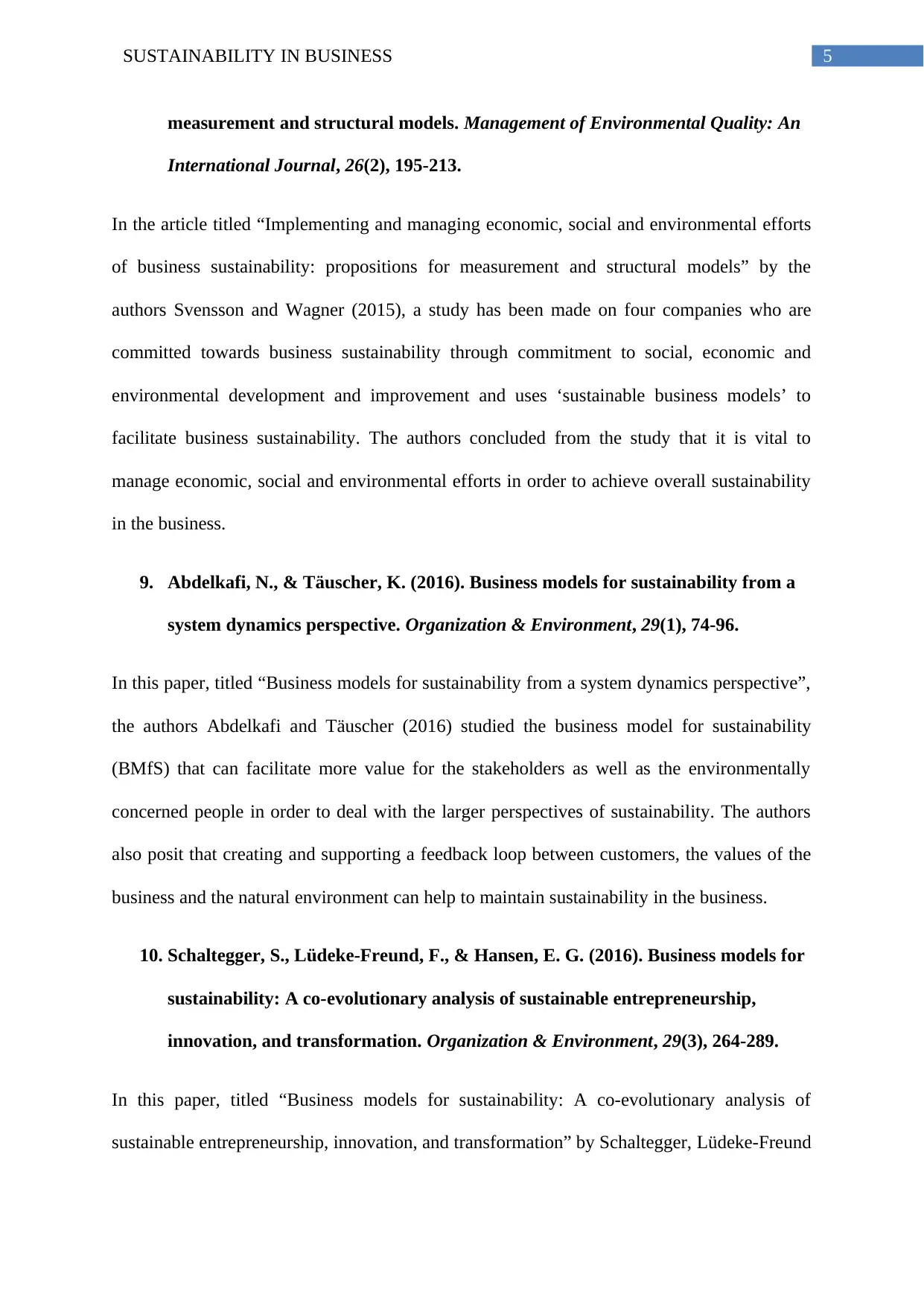
5SUSTAINABILITY IN BUSINESS
measurement and structural models. Management of Environmental Quality: An
International Journal, 26(2), 195-213.
In the article titled “Implementing and managing economic, social and environmental efforts
of business sustainability: propositions for measurement and structural models” by the
authors Svensson and Wagner (2015), a study has been made on four companies who are
committed towards business sustainability through commitment to social, economic and
environmental development and improvement and uses ‘sustainable business models’ to
facilitate business sustainability. The authors concluded from the study that it is vital to
manage economic, social and environmental efforts in order to achieve overall sustainability
in the business.
9. Abdelkafi, N., & Täuscher, K. (2016). Business models for sustainability from a
system dynamics perspective. Organization & Environment, 29(1), 74-96.
In this paper, titled “Business models for sustainability from a system dynamics perspective”,
the authors Abdelkafi and Täuscher (2016) studied the business model for sustainability
(BMfS) that can facilitate more value for the stakeholders as well as the environmentally
concerned people in order to deal with the larger perspectives of sustainability. The authors
also posit that creating and supporting a feedback loop between customers, the values of the
business and the natural environment can help to maintain sustainability in the business.
10. Schaltegger, S., Lüdeke-Freund, F., & Hansen, E. G. (2016). Business models for
sustainability: A co-evolutionary analysis of sustainable entrepreneurship,
innovation, and transformation. Organization & Environment, 29(3), 264-289.
In this paper, titled “Business models for sustainability: A co-evolutionary analysis of
sustainable entrepreneurship, innovation, and transformation” by Schaltegger, Lüdeke-Freund
measurement and structural models. Management of Environmental Quality: An
International Journal, 26(2), 195-213.
In the article titled “Implementing and managing economic, social and environmental efforts
of business sustainability: propositions for measurement and structural models” by the
authors Svensson and Wagner (2015), a study has been made on four companies who are
committed towards business sustainability through commitment to social, economic and
environmental development and improvement and uses ‘sustainable business models’ to
facilitate business sustainability. The authors concluded from the study that it is vital to
manage economic, social and environmental efforts in order to achieve overall sustainability
in the business.
9. Abdelkafi, N., & Täuscher, K. (2016). Business models for sustainability from a
system dynamics perspective. Organization & Environment, 29(1), 74-96.
In this paper, titled “Business models for sustainability from a system dynamics perspective”,
the authors Abdelkafi and Täuscher (2016) studied the business model for sustainability
(BMfS) that can facilitate more value for the stakeholders as well as the environmentally
concerned people in order to deal with the larger perspectives of sustainability. The authors
also posit that creating and supporting a feedback loop between customers, the values of the
business and the natural environment can help to maintain sustainability in the business.
10. Schaltegger, S., Lüdeke-Freund, F., & Hansen, E. G. (2016). Business models for
sustainability: A co-evolutionary analysis of sustainable entrepreneurship,
innovation, and transformation. Organization & Environment, 29(3), 264-289.
In this paper, titled “Business models for sustainability: A co-evolutionary analysis of
sustainable entrepreneurship, innovation, and transformation” by Schaltegger, Lüdeke-Freund
⊘ This is a preview!⊘
Do you want full access?
Subscribe today to unlock all pages.

Trusted by 1+ million students worldwide
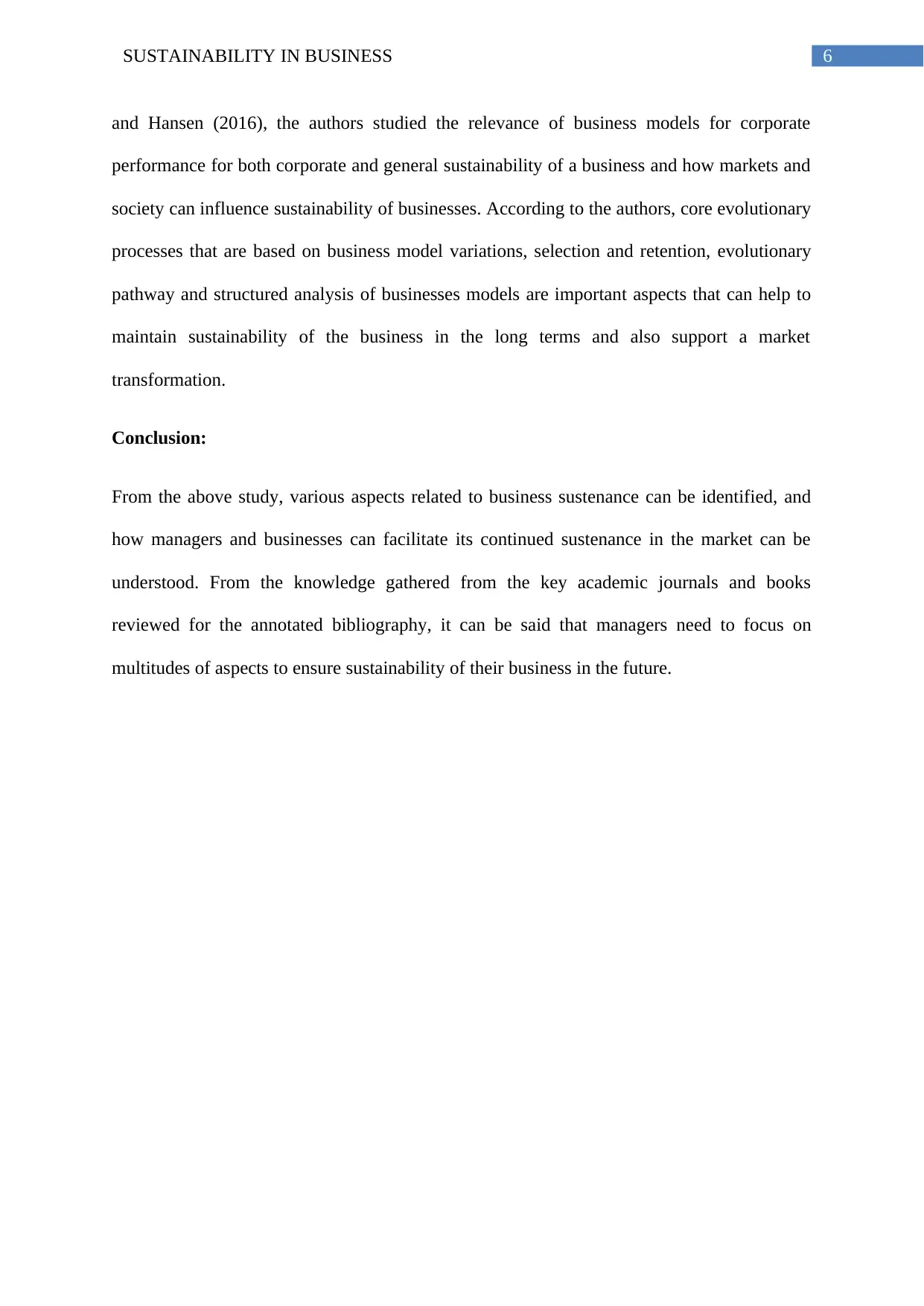
6SUSTAINABILITY IN BUSINESS
and Hansen (2016), the authors studied the relevance of business models for corporate
performance for both corporate and general sustainability of a business and how markets and
society can influence sustainability of businesses. According to the authors, core evolutionary
processes that are based on business model variations, selection and retention, evolutionary
pathway and structured analysis of businesses models are important aspects that can help to
maintain sustainability of the business in the long terms and also support a market
transformation.
Conclusion:
From the above study, various aspects related to business sustenance can be identified, and
how managers and businesses can facilitate its continued sustenance in the market can be
understood. From the knowledge gathered from the key academic journals and books
reviewed for the annotated bibliography, it can be said that managers need to focus on
multitudes of aspects to ensure sustainability of their business in the future.
and Hansen (2016), the authors studied the relevance of business models for corporate
performance for both corporate and general sustainability of a business and how markets and
society can influence sustainability of businesses. According to the authors, core evolutionary
processes that are based on business model variations, selection and retention, evolutionary
pathway and structured analysis of businesses models are important aspects that can help to
maintain sustainability of the business in the long terms and also support a market
transformation.
Conclusion:
From the above study, various aspects related to business sustenance can be identified, and
how managers and businesses can facilitate its continued sustenance in the market can be
understood. From the knowledge gathered from the key academic journals and books
reviewed for the annotated bibliography, it can be said that managers need to focus on
multitudes of aspects to ensure sustainability of their business in the future.
Paraphrase This Document
Need a fresh take? Get an instant paraphrase of this document with our AI Paraphraser
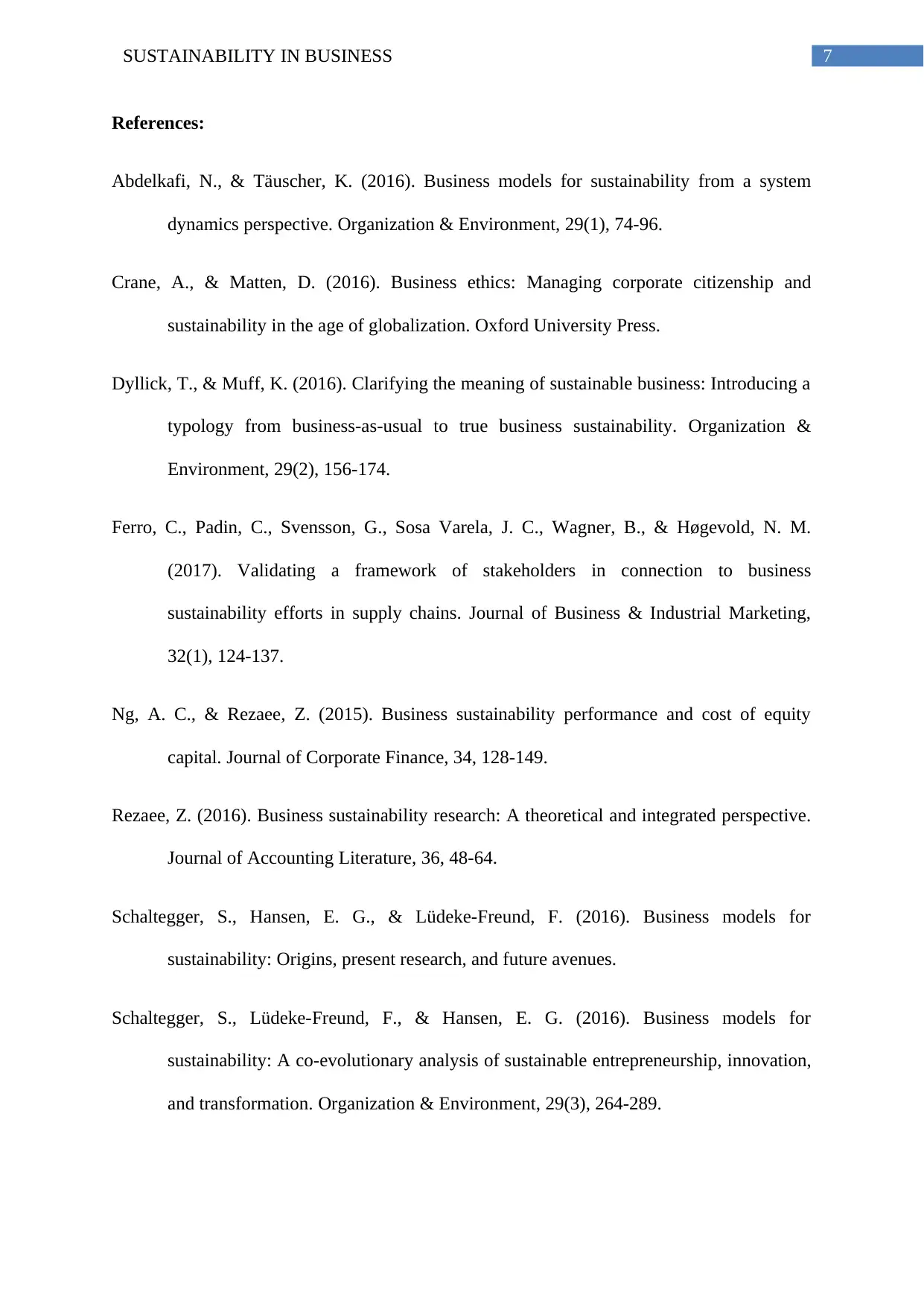
7SUSTAINABILITY IN BUSINESS
References:
Abdelkafi, N., & Täuscher, K. (2016). Business models for sustainability from a system
dynamics perspective. Organization & Environment, 29(1), 74-96.
Crane, A., & Matten, D. (2016). Business ethics: Managing corporate citizenship and
sustainability in the age of globalization. Oxford University Press.
Dyllick, T., & Muff, K. (2016). Clarifying the meaning of sustainable business: Introducing a
typology from business-as-usual to true business sustainability. Organization &
Environment, 29(2), 156-174.
Ferro, C., Padin, C., Svensson, G., Sosa Varela, J. C., Wagner, B., & Høgevold, N. M.
(2017). Validating a framework of stakeholders in connection to business
sustainability efforts in supply chains. Journal of Business & Industrial Marketing,
32(1), 124-137.
Ng, A. C., & Rezaee, Z. (2015). Business sustainability performance and cost of equity
capital. Journal of Corporate Finance, 34, 128-149.
Rezaee, Z. (2016). Business sustainability research: A theoretical and integrated perspective.
Journal of Accounting Literature, 36, 48-64.
Schaltegger, S., Hansen, E. G., & Lüdeke-Freund, F. (2016). Business models for
sustainability: Origins, present research, and future avenues.
Schaltegger, S., Lüdeke-Freund, F., & Hansen, E. G. (2016). Business models for
sustainability: A co-evolutionary analysis of sustainable entrepreneurship, innovation,
and transformation. Organization & Environment, 29(3), 264-289.
References:
Abdelkafi, N., & Täuscher, K. (2016). Business models for sustainability from a system
dynamics perspective. Organization & Environment, 29(1), 74-96.
Crane, A., & Matten, D. (2016). Business ethics: Managing corporate citizenship and
sustainability in the age of globalization. Oxford University Press.
Dyllick, T., & Muff, K. (2016). Clarifying the meaning of sustainable business: Introducing a
typology from business-as-usual to true business sustainability. Organization &
Environment, 29(2), 156-174.
Ferro, C., Padin, C., Svensson, G., Sosa Varela, J. C., Wagner, B., & Høgevold, N. M.
(2017). Validating a framework of stakeholders in connection to business
sustainability efforts in supply chains. Journal of Business & Industrial Marketing,
32(1), 124-137.
Ng, A. C., & Rezaee, Z. (2015). Business sustainability performance and cost of equity
capital. Journal of Corporate Finance, 34, 128-149.
Rezaee, Z. (2016). Business sustainability research: A theoretical and integrated perspective.
Journal of Accounting Literature, 36, 48-64.
Schaltegger, S., Hansen, E. G., & Lüdeke-Freund, F. (2016). Business models for
sustainability: Origins, present research, and future avenues.
Schaltegger, S., Lüdeke-Freund, F., & Hansen, E. G. (2016). Business models for
sustainability: A co-evolutionary analysis of sustainable entrepreneurship, innovation,
and transformation. Organization & Environment, 29(3), 264-289.
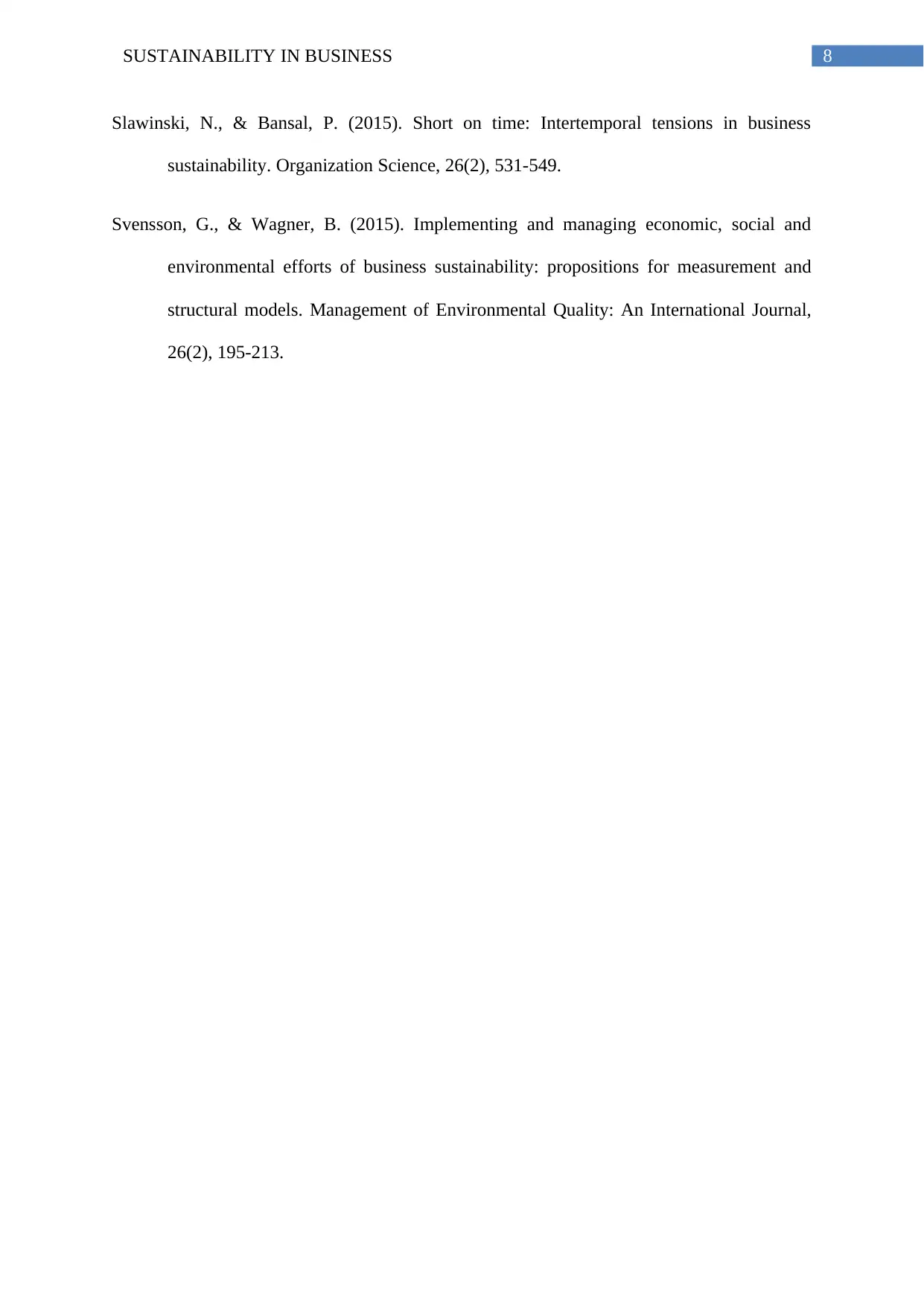
8SUSTAINABILITY IN BUSINESS
Slawinski, N., & Bansal, P. (2015). Short on time: Intertemporal tensions in business
sustainability. Organization Science, 26(2), 531-549.
Svensson, G., & Wagner, B. (2015). Implementing and managing economic, social and
environmental efforts of business sustainability: propositions for measurement and
structural models. Management of Environmental Quality: An International Journal,
26(2), 195-213.
Slawinski, N., & Bansal, P. (2015). Short on time: Intertemporal tensions in business
sustainability. Organization Science, 26(2), 531-549.
Svensson, G., & Wagner, B. (2015). Implementing and managing economic, social and
environmental efforts of business sustainability: propositions for measurement and
structural models. Management of Environmental Quality: An International Journal,
26(2), 195-213.
⊘ This is a preview!⊘
Do you want full access?
Subscribe today to unlock all pages.

Trusted by 1+ million students worldwide
1 out of 9
Related Documents
Your All-in-One AI-Powered Toolkit for Academic Success.
+13062052269
info@desklib.com
Available 24*7 on WhatsApp / Email
![[object Object]](/_next/static/media/star-bottom.7253800d.svg)
Unlock your academic potential
Copyright © 2020–2026 A2Z Services. All Rights Reserved. Developed and managed by ZUCOL.




